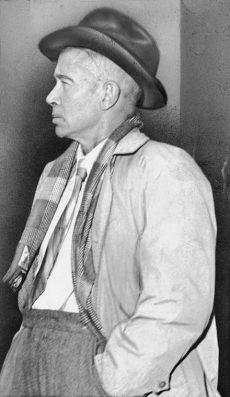
Jazz Poems
GOD PITY ME WHOM (GOD DISTINCTLY HAS) God pity me whom (god distinctly has) that weightless svelte drifting sexual feather of your shall i say body’s?follows truly through a dribbling moan of jazz whose arched occasional steep youth swallows curvingly the keenness of my hips; or, your first twitch of crisp boy flesh dips my height in a firm fragile stinging weather, (breathless with sharp necessary lips)kid female cracksman of the nifty,ruffian-rogue, laughing body with wise breasts half-grown, lisping flesh quick to thread the fattish drone of I Want a Doll, wispish-agile feet with slid steps parting the tousle of saxophonic brogue. E. E. CUMMINGSfrom Jazz Poems | Selected and edited by Kevin Young
More Posts: book,classic,collectible,history,jazz,library,poet
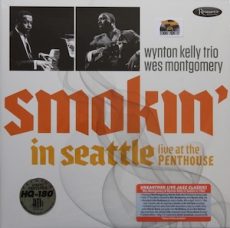
Requisites
Smokin’ In Seattle: Live at The Penthouse ~ Wynton Kelly Trio and Wes Montgomery | By Eddie Carter
I’ve been a fan of The Wynton Kelly Trio and Wes Montgomery since I was eleven and first heard Full House and Smokin’ at The Half Note. So, I was extremely happy to pick up a copy of Smokin’ In Seattle-Live at The Penthouse (Resonance Records HLP-9029), their 1966 live date over two nights from the Seattle, Washington jazz club. Jim Wilke of radio station KING-FM hosted a weekly half-hour program from The Penthouse, and he’s our Master of Ceremonies for the two sessions. The personnel for both dates are Wynton Kelly on piano, Wes Montgomery (tracks: A3 to A5, B3 to B5) on guitar, Ron McClure on bass, and Jimmy Cobb on drums. My copy is the 2017 US Mono audiophile release.
Jim Wilke kicks off Side One by welcoming the crowd and introducing the trio who opens with There Is No Greater Love by Isham Jones and Marty Symes. The group swings effortlessly through the melody, setting up Wynton’s spirited first solo. Ron comes in next for a lively presentation. Wynton and Jimmy share a brisk conversation in the closing statement leading to the song’s climax. Not a Tear by Rudy Stevenson begins deceptively like a ballad before the beat moves upward to an aggressive theme. Kelly has the song’s only solo and stretches out in a marvelous interpretation preceding the theme’s restatement.
Wes Montgomery joins the group on his original tune, Jingles. The quartet takes off on an upbeat theme. Wes goes right to work on an enthusiastic interpretation that bounces along into the foursome’s energetic finale. Up next is the poignantly beautiful standard by Bob Haggart and Johnny Burke, What’s New? The group also gives a pretty rendition of this tune on Smokin’ at The Half Note. Kelly begins with a politely touching introduction, segueing into the song’s gorgeous melody. Montgomery delivers a very personal performance in the song’s only solo ahead of the foursome’s gentle ending.
The first side ends on an upbeat note with the guitarist’s Blues In F. The group lays an impressive blueprint on the opening chorus. Wes has the solo spotlight to himself and delivers an exciting flow of ideas that sadly fade out due to the program’s time constraints. Mr. Wilke starts Side Two with his introduction to The Wynton Kelly Trio, who play The Theme, briefly starting their first number, Sir John, by Blue Mitchell. After the trio states the melody, Kelly gets his teeth into a brilliant opening statement. McClure lets his bass do the talking in the following solo before the pianist makes a few final comments, leading to the theme’s reprise.
If You Could See Me Now by Tadd Dameron and Carl Sigman is also on Smokin’ at The Half Note. The trio works together beautifully from the start of Wynton’s lush introduction. As the song’s only soloist, Kelly reveals the warmth and tenderness anchored by Ron’s and Jimmy’s support. West Coast Blues is a Montgomery original from Movin’ Wes. It comes to life with the guitarist’s introduction, segueing into the foursome’s easygoing theme. The song’s only solo belongs to Wes, and he delivers the goods to an infectious beat that is sure to have the listener tapping their feet ahead of the close.
O Morro Não Tem Vez by Antonio Carlos Jobim and Vinícius De Moraes is a beautiful Brazilian song and a highlight of the album Goin’ Out of My Head. Jimmy gets things going with a percussion introduction that blossoms into a lovely melody. Wes gets to stretch out and delivers a gorgeous performance preceding the foursome’s return for the theme’s restatement and climax. The album and set concludes with Oleo by Sonny Rollins. The ensemble starts things off with a zesty melody, then steps aside for Wes to take charge of the song’s only statement that concludes with a slow dissolve into nothingness.
Zev Feldman and George Klabin produced Smokin’ In Seattle. Jim Wilke was the original recording engineer, and Bernie Grundman mastered the album. The record was pressed on 180 grams of audiophile vinyl, and the album’s sound quality is quite good for a sixties live recording. The listener is transported to the club audience as the musicians are performing. The record is also incredibly quiet until Jim Wilke speaks. If you’re a fan of The Wynton Kelly Trio and Wes Montgomery, I offer, for your consideration, Smokin’ In Seattle the next time you’re out record-shopping. The music is simply amazing, and this is an album you shouldn’t miss for a spot in your library!
~ Full House (Riverside RLP 434/RS 9434), Goin’ Out of My Head (Verve Records V-8642/V6-8642), Movin’ Wes (Verve Records V-8610/V6-8610), Smokin’ at The Half Note (Verve Records V-8633/V6-8633) – Source: Discogs.com ~ If You Could See Me Now, Oleo, There Is No Greater Love, What’s New? – Source: JazzStandards.com
© 2023 by Edward Thomas Carter
More Posts: choice,classic,collectible,collector,history,instrumental,jazz,music,piano
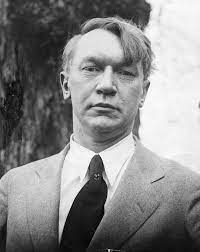
Jazz Poems
THE JAZZ OF THIS HOTEL Why do I curse the jazz of this hotel? I like the slower tom-toms of the sea; I like the slower tom-toms of the thunder; I like the more deliberate dancing knee Of outdoor love, of outdoor talk and wonder. I like the slower, deeper violin Of the wind across the fields of Indian corn; I like the far more ancient violincello Of whittling loafers telling stories mellow Down at the village grocery in the sun; I like the slower bells that ring for church Across the Indiana landscape old. Therefore I curse the jazz of this hotelThat seems so hot, but is so hard and cold
VACHEL LINDSAY
from Jazz Poems | Selected and edited by Kevin Young
More Posts: book,classic,collectible,history,jazz,library,poet
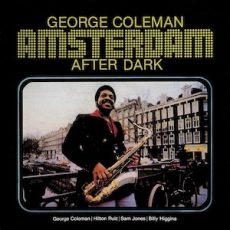
Requisites
Amsterdam After Dark ~ George Coleman | By Eddie Carter
George Coleman enters this morning’s spotlight with an excellent 1979 quartet album, Amsterdam After Dark (Timeless SJP 129). I first heard him playing alto on Houseparty and The Sermon. I later discovered he also played tenor and enjoyed his work on Eastern Rebellion, ‘Four’ and More, Maiden Voyage, Miles Davis In Europe, My Funny Valentine and Seven Steps To Heaven. This morning’s album from the library was his debut as a leader, and he composed four of the tunes. He’s joined on this date by The Hilton Ruiz Trio. Hilton Ruiz on piano and Eastern Rebellion colleagues Sam Jones on bass and Billy Higgins on drums. My copy is the original Netherlands Stereo release.
Side One opens with the trio’s introduction to the title tune, Amsterdam After Dark. George takes over and starts the fire burning on the song’s infectious melody and opening solo. Hilton sinks his teeth into the second reading, and then Sam speaks confidently, preceding the tenor’s joyful vitality in the closing chorus. Hilton Ruiz’s New Arrival picks up the quartet’s pace in an engaging opening chorus. Coleman takes flight first and builds a perfectly crafted interpretation effectively. Ruiz comes on next and is shown to great advantage in the closing statement ahead of the theme’s reprise and fadeout.
Lo-Joe is a feisty original that opens with an airy statement of the theme. George gets things going with a passionate first solo, followed by Hilton, who suggests a happy mood in the second statement. Billy’s brushwork in the closing statement swings very nicely into the foursome’s ending theme and exit. Autumn In New York by Vernon Duke is the album’s only standard. The quartet dresses up this old favorite with an intimately tender introduction and melody. Coleman’s opening statement is reflective and quite beautiful. Ruiz takes a moment for an elegantly exquisite comment leading to the leader’s delicately pretty ending.
Apache Dance is an impressive tune from the opening notes of the two-instrument conversation with tenor sax and drums, leading to a quick run of the ensemble’s theme. George unravels a lot of twists and turns in the first solo. Hilton comes right behind him, keeping his foot on the gas. Billy delivers the song’s final solo until the group reappears to take it out. Blondie’s Waltz begins with the quartet establishing an optimistic melody. Coleman starts things off with a beautifully phrased statement. Ruiz jumps in next to move things along in a lively interpretation. Higgins adds to the fun with a short spot until Coleman’s reappearance for the finale.
Wim Wigt produced Amsterdam After Dark. Bob De Caro and Jim McCurdy were the recording engineers. The album has an exceptional soundstage that comes through your speakers convincingly. If you close your eyes, it’s like the musicians are playing right in front of you. George Coleman is on fire throughout each selection, and the trio compliments him efficiently. At 88 years old, he’s showing no signs of slowing down and is still performing for jazz fans. I’ve caught a few of his performances at Smalls via their nightly streams. If you only have albums with George Coleman as a sideman, I invite you to take a trip to visit Amsterdam After Dark. It’s worth every penny for a spot in your library and is an excellent trip you can take without leaving the comfort of your chair!
~ Eastern Rebellion (Timeless SJP 101), ‘Four’ and More (Columbia CL 2453/CS 9253), Houseparty (Blue Note BLP 4002/BST 84002), Maiden Voyage (Blue Note BLP 4195/BST 84195), Miles Davis In Europe (Columbia CL 2183/CS 8983), My Funny Valentine (Columbia CL 2306/CS 9106), Seven Steps To Heaven (Columbia CL 2051/CS 8851), The Sermon (Blue Note BLP 4011/BST 84011) – Source: Discogs.com ~ Autumn In New York – Source: JazzStandards.com © 2023 by Edward Thomas Carter
More Posts: choice,classic,collectible,collector,history,instrumental,jazz,music,saxophone
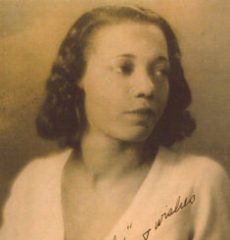
Jazz Poems
POEM Little brown boy, Slim, dark, big-eyed, Crooning love songs to your banjo Down at Lafayette– Gee, boy, I love the way you hold your head, High sort of and a bit to one side, Like a prince, a jazz prince, And I love Your eyes flashing, and your hands, And your patent-leathered feet And your shoulders jerking the jig-wa. And I love your teeth flashing, And the way your hair shines in the spotlight Like it was the real stuff. Gee, brown boy, I loves you all I’m glad I’m a jig. I’m glad I can Understand your dancin’ and your Singin’ and feel all the happiness And joy and don’t-care in you. Gee, boy, when you sing, I can close my ears And hear tom-toms just as plain. Listen to me, will you, what do I know About tom-toms? But I like the word, sort of, Don’t you? It belongs to us. Gee, boy, I love the way you hold your head, And the way you sing and dance, And everything. Say, I think you’re wonderful. You’re All right with me. You are. HELENE JOHNSONfrom Jazz Poems ~ Selected and Edited by Kevin Young
More Posts: book,classic,collectible,history,jazz,library,poet



